| St Mary's Church
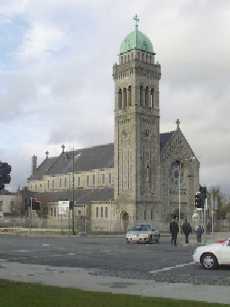
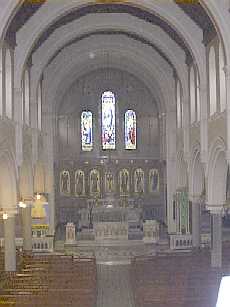
© St Mary's church and Altar in St Mary's church
St Mary's church was built between 1930/32 and replaced
the church of 1749, which was demolished. The church is dedicated to Our
Lady of the Assumption. All that remains of the 1749 church is the holy
water font and a plaque at the rear of the church. The architects of the
church were Ashling & Coleman of Dublin. Emigrants of the parish,
traders in Limerick and the people of the parish raised the finance for
the church.
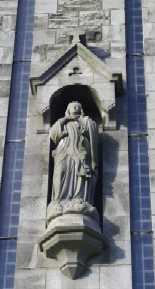
© Statue of Mary on
wall of St Mary's church
The church is built in Hiberno-Romanesque style with the
dome of the bell tower in the Byzantine style. It was built using limestone
from Redgate, Co. Clare. On the outside of the church to the left, there
is a statue of Mary set in the stonework of the church. The foundation
stone was laid by Bishop Keane in May 1930 during the tenure of Fr Michael
Hannan as parish priest.


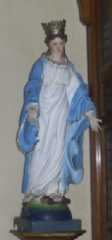
© Statues of the Sacred Heart, St Therese and the Virgin Mary
Inside the main church entrance, there are two statues.
The statue on the right is of the Virgin Mary and is believed to be over
200 years old. The statue on the left is of the Sacred Heart. There is
a statue in the left aisle of the church to St Therese the Little Flower.
Mrs. Dinneen donated this statue.
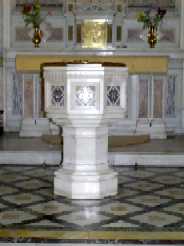
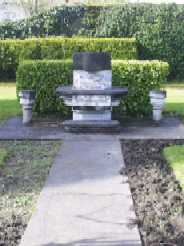
© Baptismal font from St Mary's church, and baptismal font from previous
church
At the top of the left aisle, there is an altar to St Joseph,
which is to the memory of Rev. Laurence O'Keeffe, a curate in St Mary's
from 1870 until his death in 1881. The parishioners erected this altar.
Within the altar is the baptismal font.
Also on the left of the church, there is a Jubilee 2000
painting. James O'Halloran donated the Stations of the Cross. Charles
Harty donated the statue of the Pieta in memory of his wife. The women
of the Holy Family Confraternity donated the altar rails.
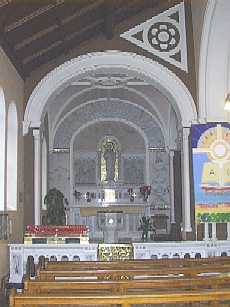

© Altar to St Joseph and altar to the Blessed Virgin
The altar to the right of the high altar is to the Blessed
Virgin. Near this altar there is a plaque commemorating the Diamond Jubilee
of Fr Patrick Lee PP on June 20 1980. Fr Lee was appointed parish priest
of St Mary's in 1944.
There are three stained glass windows at the back of the
altar, which show (from left to right) the Visitation, the Assumption
and the Annunciation. The stained glass windows were donated by Maire
Moore, John & Maire Shanahan and Paul Bernard respectively.
The tabernacle is made from gold that was melted down. This
gold originally belonged to parishioners in the form of rings and other
objects. The doors of the tabernacle depict the four evangelists. There
is a Venetian mosaic depicting six angels behind the high altar. The six
angels are unnamed and under each mosaic of an angel, there is a verse
from the hymn "Te Deum".
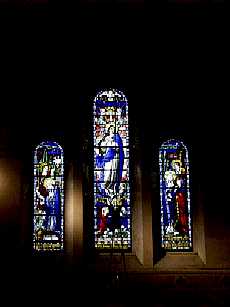
© Stained glass windows behind altar in St Mary's church
In the 18th century, Limerick was a major port and trading
center. A Limerick merchant was unable to pay his supplier in Rotterdam
due to a storm at sea. The firm sent a representative from Rotterdam to
see why their money was delayed. When the visitor got to Limerick, he
received his money and was so happy that he gave the Roman Catholic church
a valuable monstrance in thanks.
The inscription on the monstrance states that it is from
James Archdeacon, Rotterdam, and Holland to the Roman Catholics of St
Mary's Parish. The inscription is in Latin and dates from 1751. The monstrance
is made of silver, gilt in gold and surmounted by a cross and crown over
a symbol of the world (see chalices section).
The parish records of St Mary's date from January 1745 when
Fr James White who was a curate in the parish from 1738 until his death
in 1768 began to write the details of the marriages and baptisms in Latin.
The records are the second oldest continuous set of details in Ireland.
These details were interspersed with historical details from the time.
Fr White also drew a detailed map of Limerick and wrote a history of the
Diocese of Limerick in 1764, which was the basis of the histories of the
Diocese of Limerick by Ferrar, Lenihan and Begley.
The Bells of St Mary's were a gift from John Budston in
1401. According to legend, they were made by an Italian. However, on completion,
the bells were stolen and the maker searched the world for them. While
travelling up the Shannon, he heard the chimes of the bells of St Mary's
and he knew they were his bells. He was so full of joy that he died on
the spot.
In the parish there was also a number of places of worship
down through centuries. Before the present day church, building commenced
on a church in 1748 in Little Island and the first mass was said there
on Christmas morning 1749. This was the first church built in Munster
after the relaxation of the penal laws. The land for the church was acquired
from Alderman Ingram and was situated just outside the city walls. At
that time in the eighteenth century, it was the largest Catholic Church
in Munster. It was dedicated to Our Lady the Virgin.
Before this, the parish church was near the present St Munchin's
church in Thomondgate. It would be more correct to describe this church
as a mass house and it was shared by the parishes of St Mary and St Munchin.
This church served the needs of the people of the city during the early
years of the penal laws. A new church was constructed during 1748. Mass
was also said in King John's Castle, which was within the parish boundaries
from 1665 but this ended with the overthrow of King James by William,
Prince of Orange in 1688.
According to Westropp, Monaster na Callow Duffe
was also in the parish of St Mary's. The monastery was also known as the
Black Abbey but it is more commonly known as the friary of the Dominican
order.
For a number of years, there was no seating in the church
due to a Mr John Stritch. According to Denis O'Shaughnessy's book A Spot
So Far - Tales from St Mary's, Stritch was unhappy with his pew's position
and built one for himself near the altar rails. The position of the church
pews was arranged in proportion to each family's subscription. Stritch's
pew was removed and when he found out, he was so angry, he broke all the
new pews in the church with a sledgehammer.
Buried in the grounds of the church are:
 Laurence O'Keeffe, Curate 1870-188, Died Nov. 12 1881, aged 37
Laurence O'Keeffe, Curate 1870-188, Died Nov. 12 1881, aged 37
 Michael
Fitzgerald, Parish Priest 1870-1871, Died May 31 1871, aged 42 Michael
Fitzgerald, Parish Priest 1870-1871, Died May 31 1871, aged 42
 Charles
Hanrahan, Parish Priest 1813-40, Died Feb. 29 1840, aged 56 Charles
Hanrahan, Parish Priest 1813-40, Died Feb. 29 1840, aged 56
 Daniel
Fitzgerald, Parish Priest 1878-94, Died Nov. 10 1894, aged 62 Daniel
Fitzgerald, Parish Priest 1878-94, Died Nov. 10 1894, aged 62
 
|